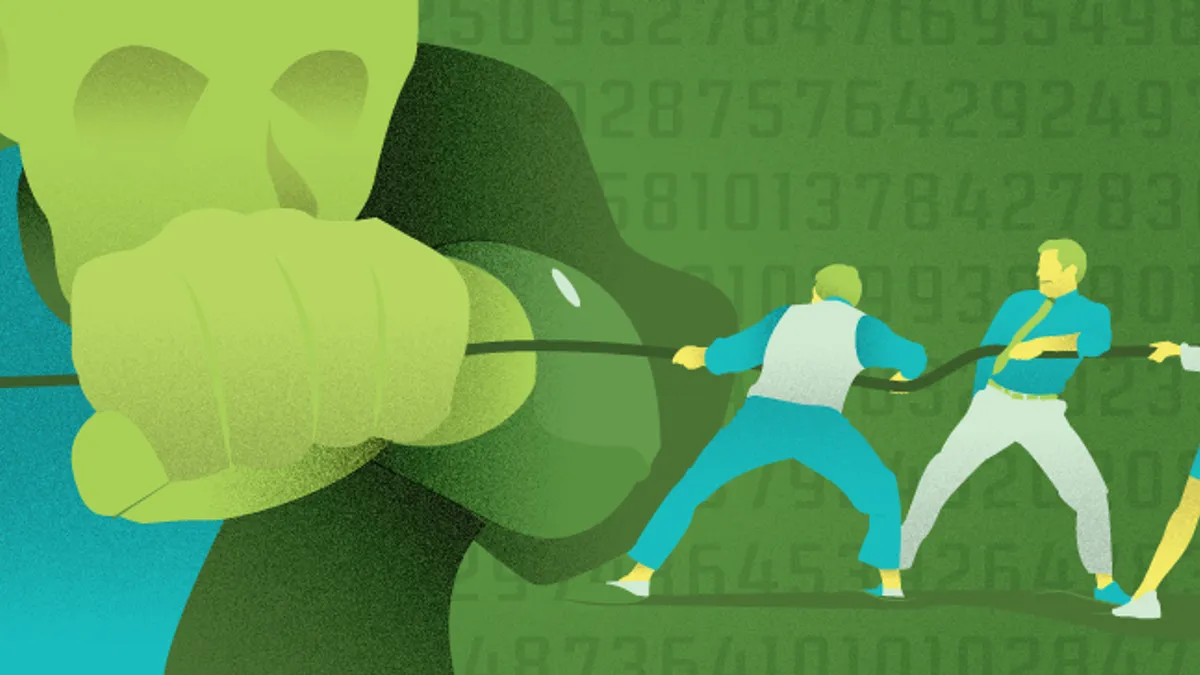This is the first of a two-part series looking at the opposing sides in the broadband regulation debate. Check in Thursday to read up on "internet freedom" arguments as the FCC votes on Chairman Pai's proposal.
Update: The article has been updated to clarify precedent of bright-line rules and the jurisdiction of the FTC.
It is rare for niche technology regulations to dominate headlines and garner the attention — let alone reaction — of millions. Yet broadband regulation continued to takeover technology and political headlines, even in the midst of a contentious political era.
So what does the status quo, set by Obama-era net neutrality rules, mean for the enterprise?
Net neutrality is a system in which consumers pay companies for unencumbered internet access —where broadband providers do not interfere with the "freewheeling" internet market, including content, applications and services, said Ryan Singel, founder of Contextly and fellow at Stanford Law School's Center for Internet and Society.
What is net neutrality?
A 2013 back and forth between Netflix and Comcast helps illustrate the heart of proponents' argument.
To simplify a complex series of interactions, Comcast decided Netflix could not continue accessing its network for streaming services without paying an access fee, said Singel. Netflix said "no," its streaming quality plummeted for many months until the content provider finally agreed to pay the internet service provider (ISP).
Many consumers and businesses were not pleased, but ISPs carried on.
Then, in 2015, the FCC reclassified broadband providers from "information providers" under Title I to "common carriers" under Title II of the Communications Act. This increased the legal standing of 2010 neutrality rules and moved the onus of policing to the FCC from the FTC.
"The easy trope of it is it's two big industries battling over it — and it's just not the case … It's the folks that haven't made it yet that need the protections against internet service providers messing with the free market on the internet."

Ryan Singel
Founder of Contextly and fellow at Stanford Law School's Center for Internet and Society
Whether the FCC or FTC is best suited to police neutrality is now up for contention. The FTC would handle violations ex-post, compared to the ex-ante approach under current regulations. "We're simply shifting from one-size-fits-all preemptive regulation to targeted enforcement that focuses enforcement action on actual market failure," said Ajit Pai at an event in D.C. in November, adding that returning policing power to the FTC will allow for this.
Net neutrality proponents do not agree the FTC is better suited to police. "The FCC has always recognized the danger the ISPs pose to the freewheeling market of the internet generally," said Singel, but "this FTC has not shown the concern the previous FCCs have shown about the previous history of ISPs interfering with free markets."
A move away from Title II classification may not have significant short-term effects, but in the long run it will greatly restrict the FCC's ability to do things, said Shane Greenstein, professor at Harvard Business School. Title II "was a legal justification for action that would permit quicker action than what it's replacing, which is Title I justification," said Greenstein.
The Open Internet Order also expanded the scope of and regulatory power over three bright-line for ISPs
- No paid prioritization
- No blocking content
- No throttling traffic based on source, destination or content
Under FCC Chairman Ajit Pai's proposal, these rules will no longer be in effect and companies will be required to have transparency disclosures instead.
According to net neutrality proponents, the removal of the anti-discrimination rule will allow ISPs to direct traffic between slow and fast lane.
Higher prices will get customers of ISPs access to faster lanes, but this can get especially costly for content providers like Netflix with high bandwidth demands — costs which may then be passed off to consumers. "The capacity issues are more binding in high-density environments and where streaming can take up a lot of capacity relative to what's available," according to Greenstein.
All about the little guys
Many arguments for Pai's proposal rest on the potential boon to infrastructure and investment that could follow the removal of heavy-handed government regulations.
This conversation, however, tends to focus on a small subset of broadband infrastructure — that which ISPs own — and not other forms such as content, applications and services, according to Singel.
"The FCC order, someone just doesn't understand that outside of broadband ISPs there's been huge innovation and investment in infrastructure, but that's not something they talk about," Singel said. "When they talk about infrastructure, they're simply talking about Sprint, Comcast, AT&T."
Other forms of innovation have allowed smaller companies and startups to easily deliver content alongside larger companies. But if the 2015 regulations are rolled back, ISPs will have more power and can maintain a tight grip on the market, shutting out new competitors, according to net neutrality advocates.
And net neutrality is all about the little guys.
"The easy trope of it is it's two big industries battling over it — and it's just not the case," said Singel. "[Big tech companies] generally, corporately agree that net neutrality is a better model, but its not necessary for them anymore — they've made it. It's the folks that haven't made it yet that need the protections against internet service providers messing with the free market on the internet."
"The FCC order, someone just doesn't understand that outside of broadband ISPs there's been huge innovation and investment in infrastructure, but that's not something they talk about. When they talk about infrastructure, they're simply talking about Sprint, Comcast, AT&T."

Ryan Singel
Founder of Contextly and fellow at Stanford Law School's Center for Internet and Society
ISPs already have the ability to implement differential pricing, but taking the risk and allowing them greater leeway to levy access fees from content providers. This could only feed into the profit margins of ISPs at the expense of other companies, startups and consumers.
The current regulations have only been in place about two years. And if leadership and partisan leanings change in the coming elections, that could mean another reversal in regulation frameworks within a matter of years.
Bouncing back and forth will generate uncertainty in the enterprise and may cause many market players to reduce their presence or choose not to enter at all.
Small business owners can look at how their digital business has changed, if at all, since the 2015 regulations went into effect. Pricing, internet speed and customer satisfaction all offer valuable insight into how the internet framework serves them best.
"Does it feel like since 2015 wireless companies have basically given up on the market and feel like they can't make money anymore because there's so much heavy handed regulation? I don't think it seems that way at all," said Singel. "The nice thing about the rules is that you shouldn't notice them because they simply prevent that behavior."
And if the internet has gotten better over last seven years, it means the status quo is working for them.





















